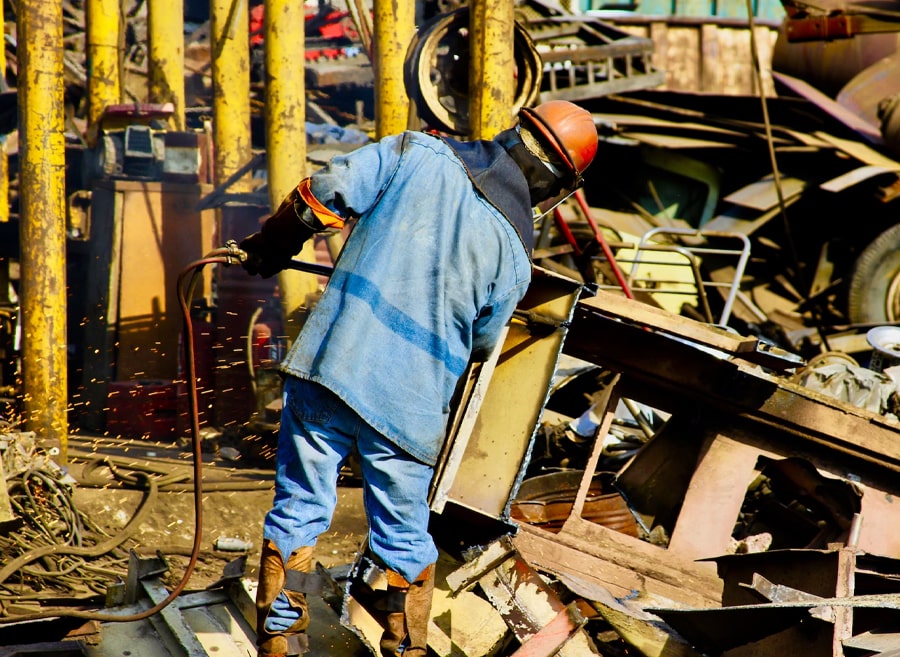Though no one wants the inconvenience or expense of upgrading a dishwasher or water heater, these appliances might break down, become antiquated, or no longer fit our needs. But, before you bring in the gleaming new model, you should know how to properly dispose of appliances. You can’t always just throw your old refrigerator out on garbage day since it contains hazardous components that must be treated with care. Here are seven safe ways to get rid of old appliances to help you make more space in your home.
7 Ways to Get Rid of Old Appliances
Are you stuck with an old appliance? Here are some tips on how to get rid of it and make a positive impact!
1. Make a Pickup Appointment
Some appliances can be placed on the curb for garbage pickup depending on where you reside. However, your municipality may charge you a fee and demand you to plan a pick-up and disposal appointment. The larger the appliance, the more probable it will require a special pick up.
Refrigerators and air conditioners—anything containing freon, CFCs, or other refrigerant gases—will require particular handling when disposed of. To securely recycle or dispose the device, the sanitation staff must take extra precautions to remove these toxins. You should not attempt to remove any refrigerant gases on your own unless you are a technician certified in their removal due to environmental rules aimed to protect the ozone layer.
Alternatively, you might hire a junk removal service. This option is especially useful if you’re getting rid of appliances as part of a larger cleaning or moving project. You could have the junk removal company collect the appliances immediately, or you could calculate the cost of renting a dumpster and having a hauling service remove it after you’re finished.
2. Recycle Them

Instead of dumping them in the trash, your appliances can be recycled to find new life. Recycling is not only better for the environment than letting appliances to sit in a landfill, but it is also often a simpler and less expensive process than using a municipal or professional pickup service. Some organizations will even provide incentives to people to encourage them to recycle. Contact your local recycling center to learn about their policies, such as if you need to disassemble or remove doors from your appliances before scheduling pick-up. Sometimes dropping off your belongings at the facility is your only option, so seek the help of a friend to transport that washing machine.
3. Give Them Away
You don’t have to throw away your appliances if they still work. Many people, such as college students and first-time homeowners, require appliances such as ovens, clothes dryers, and water heaters yet may be unable to buy them. Consider donating your appliances to a local charitable organization or someone you know in your community.
Churches and shelters frequently have donation drives, and some may accept your appliances. They may even transport away major objects like refrigerators for free or at a lower rate than professional junk removal. These non-profit organizations can then either sell the appliances to raise funds or directly donate them to those in need.
4. Trade them in for a Better Model
Customers can trade in their old appliances for lower prices on newer models at several outlets. As part of a membership program, some of these companies may even uninstall and pick up the old model for a price or for free. When given as a convenience when acquiring a new appliance, these services are an excellent way to save both time and money.
Check any warranties you may have received on your appliances to see if you are qualified for a trade-in. Even if you aren’t, the shop may offer you the services of a competent expert who may either fix or dispose of your item locally.
5. Turn Them in for a Rebate
Gas providers, water utilities, and electric companies are frequently happy to accept abandoned stoves, water heaters, refrigerators, or other major appliances for proper disposal or donation. In exchange, you will receive a utility bill rebate, a credit towards the purchase of your next appliances, or perhaps cash.
Check with your utility company to determine if your appliance is eligible for a pickup, which may be free of charge. Many utility companies also organize drop-off events for smaller appliances, allowing you to bring the appliance to a place and turn it in there.
These events may allow huge items if you are willing to haul them yourself or hire someone to do so for you.
6. Throw them away
If you’re wondering how to get rid of a water heater, its copper and brass parts make it a good choice for your local scrap metal buyer. However, other large appliances made mostly of metal also qualify. Contact with a scrap company about accepting your things. You can also see which ones are the most valuable.
Not only would these companies dispose of the equipment correctly, but some may even truck it away for you. You’ll also make some money in the process. The more metal available for the scrap buyer and the more money you could potentially walk away with, the larger and older the appliance.
7. Put them on the market for resale.
You can sell your appliances if they are in functioning order or if you can find a buyer prepared to fix them. Online marketplaces include areas for selling secondhand appliances such as refrigerators, ovens, washers and dryers, and others. Alternatively, charities such as Habitat for Humanity will sell used appliances to individuals in need, so check their policies as well.





